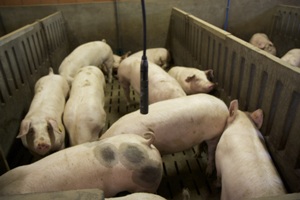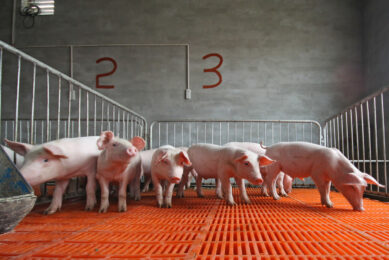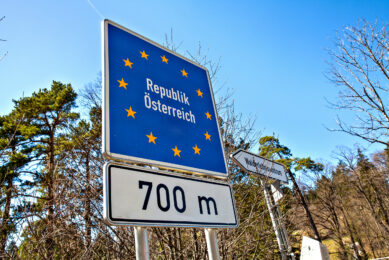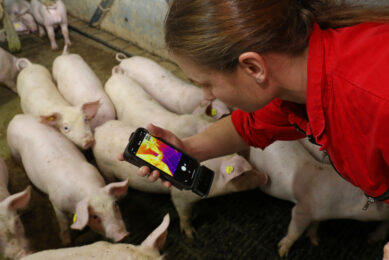Fancom launches sound system to detect coughing in pig houses

Livestock equipment company Fancom will launch a microphone-operated system to detect coughing in pig houses. The novel approach will be highlighted at the upcoming EuroTier, in Hanover, Germany, through November 13-16.
The novel system, called Pig Cough Monitor, is geared at detecting the coughing in pig houses and is capable of distinguishing coughs from other sounds in any pig house, like ventilation noise, human speech, closing doors, mechanical contact noises, etc. It can also distinguish between non-productive coughs (often dust-related) and productive coughs (often caused by pathogens, e.g. Pasteurella multocida).
Using a system consisting of a control with analysing software and two microphones installed at several locations, data will be saved and interpreted – and should an unwanted situation occur with more than normal amounts of coughs, a signal can be sent to the farm manager or veterinarian.
Development
The system is developed by SoundTalks, a company set up in cooperation with Leuven University, Belgium. Netherlands-based Fancom plays a large role as technology partner and providing an international platform for the approach.
SoundTalks CTO Wilm Decré (picture) said that the Pig Cough Monitor will be enable pork producers to lower their use of antibiotics, to improve animal health and welfare and consequently their performance. The system allows producers to monitor health status in several pig houses or several sites in the area.
Veterinarians will also be able to profit as the health status of clients can be observed remotely. Governments even can use the system to get an overview of the respiratory disease status in a country.
Animal Welfare Monitor
The novel system, already in use in about 20 locations throughout Europe, was highlighted on Tuesday afternoon at a seminar around the concept of an Animal Welfare Monitor at the University of Ghent, Belgium.
The sound approach is therefore part of a larger system, which is still in development, to create a very complete animal welfare monitoring system by applying Precision Livestock Farming techniques. Within the frames of this project, researchers at Leuven University and Ghent University are also researching a camera component.
The researchers believe video images can help explaining a lot about the animal’s behaviour – and would like to use the material for more. The accuracy of e.g. estimating pig water consumption by localising pigs on camera near the water nipple is already over 90%.
Related websites:
• Fancom
• SoundTalks
• EuroTier











